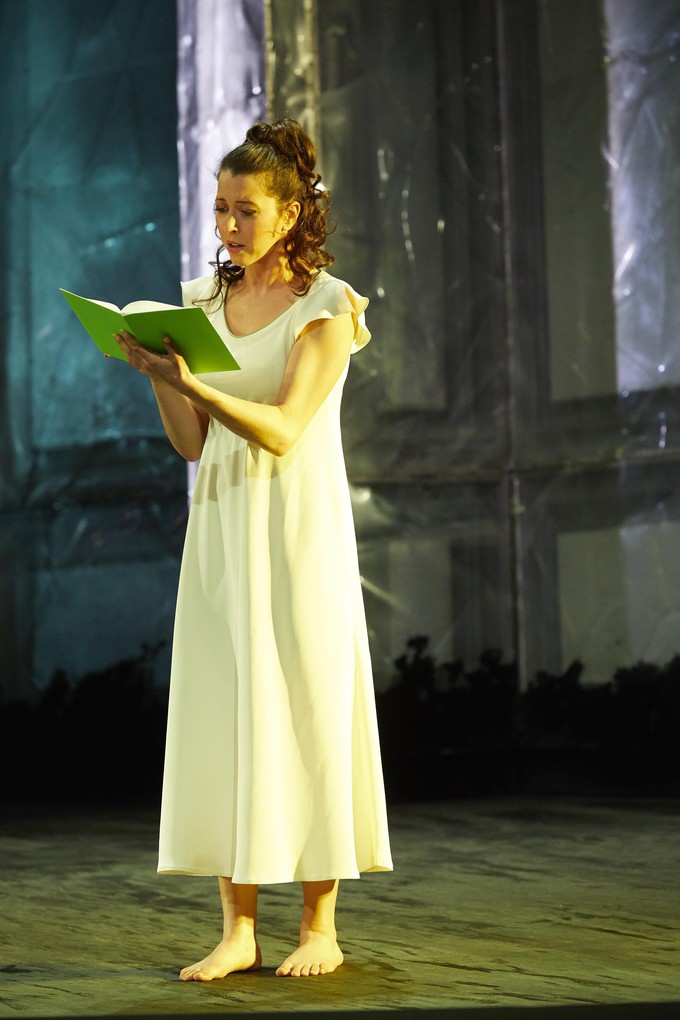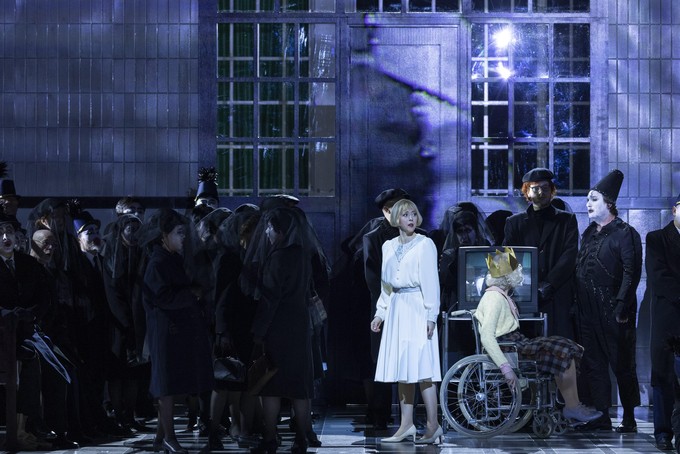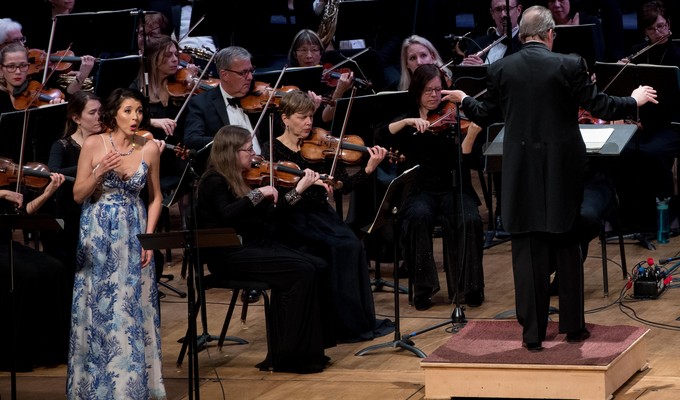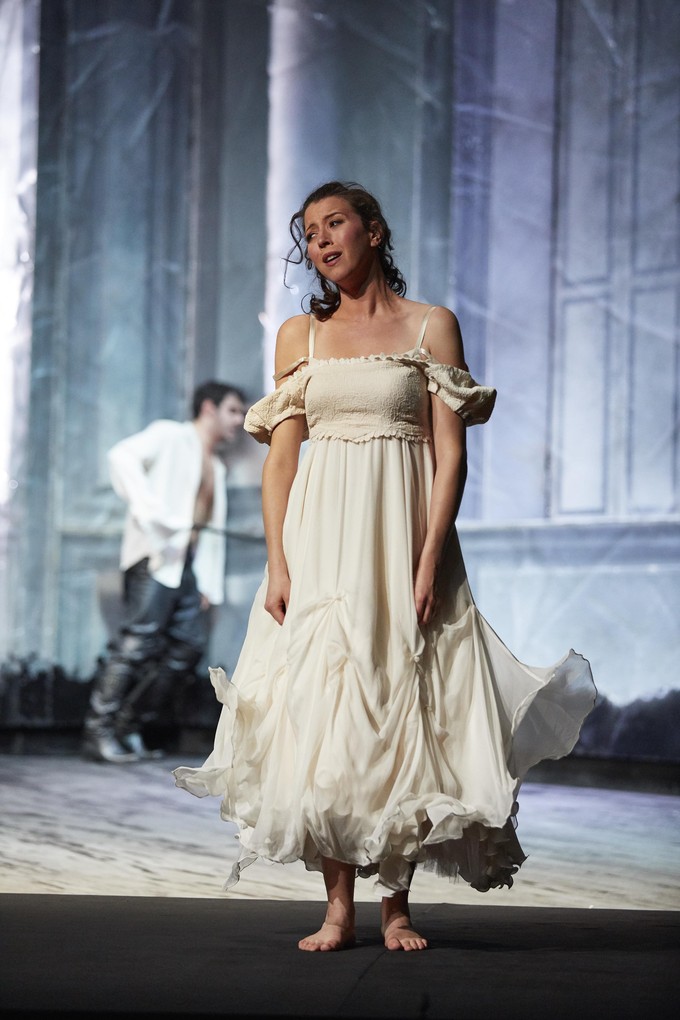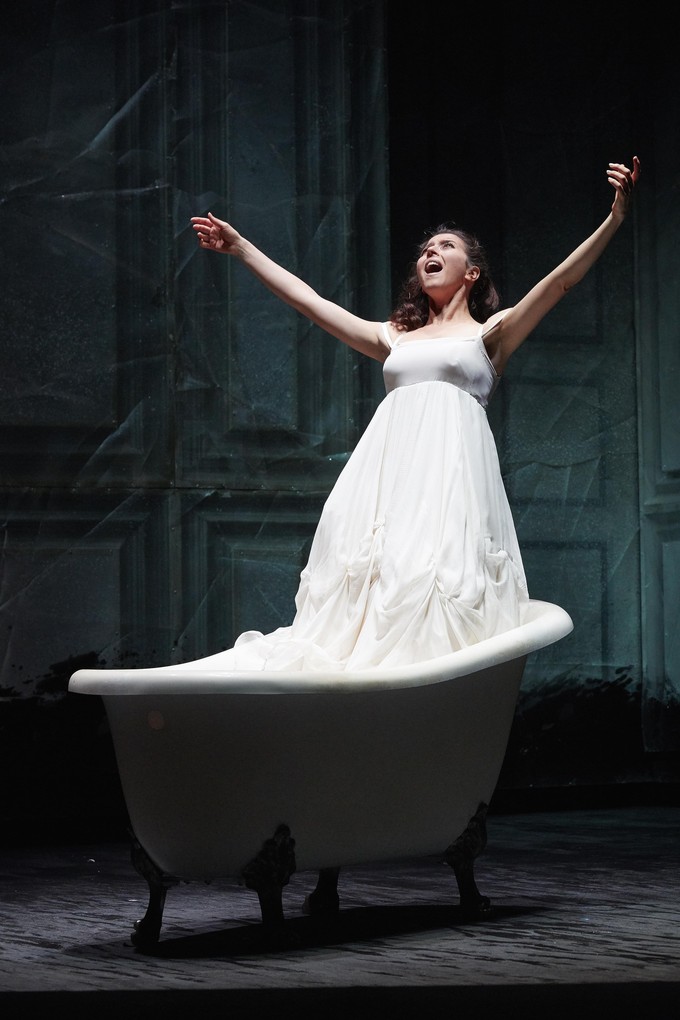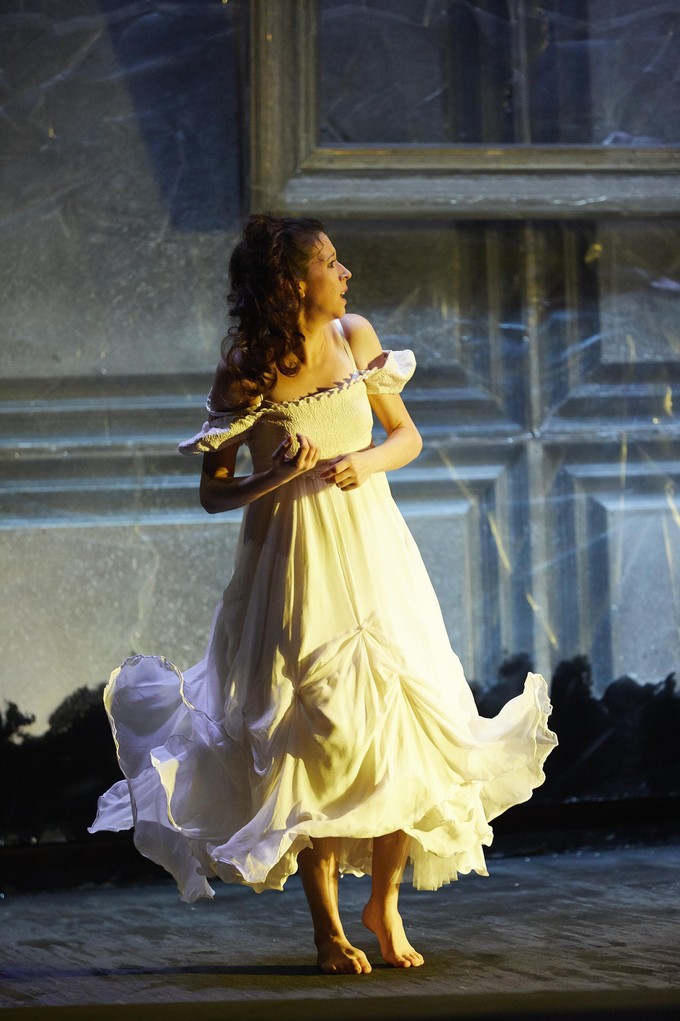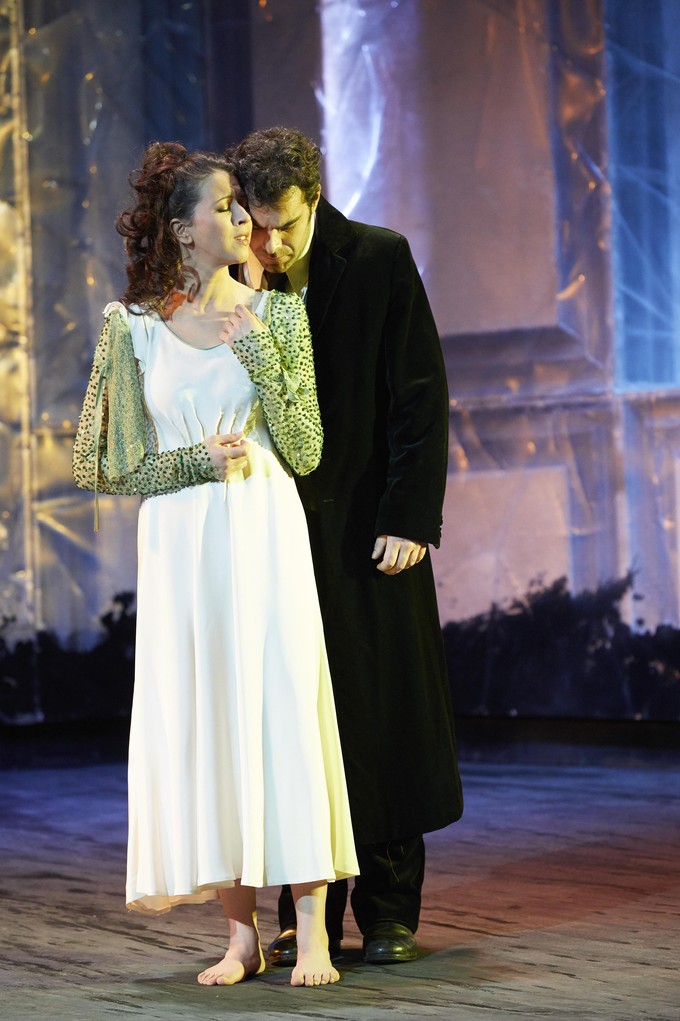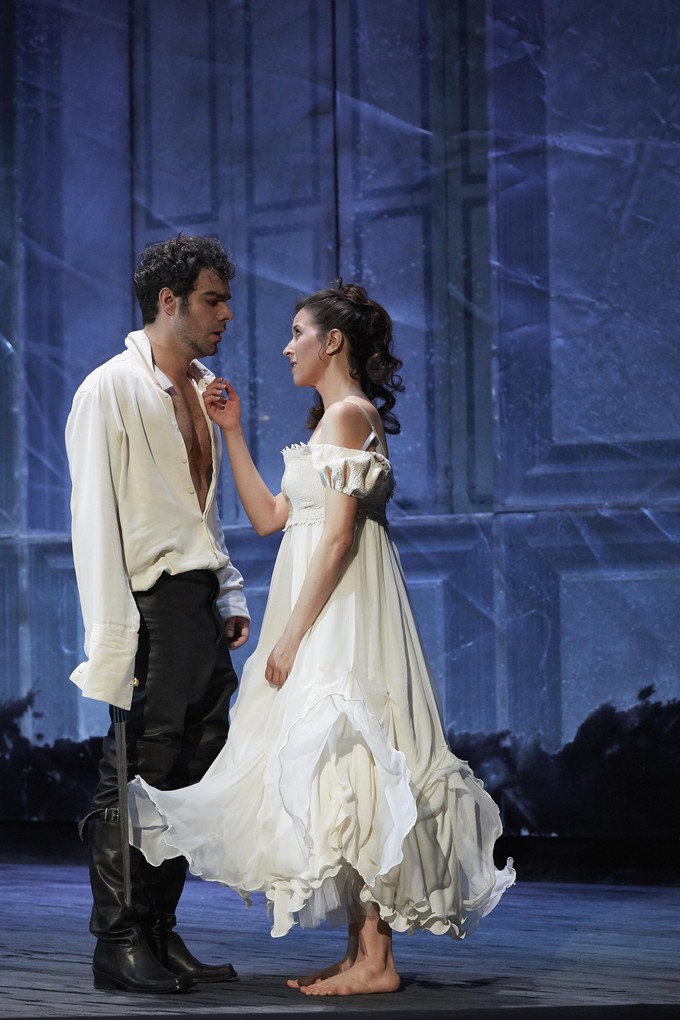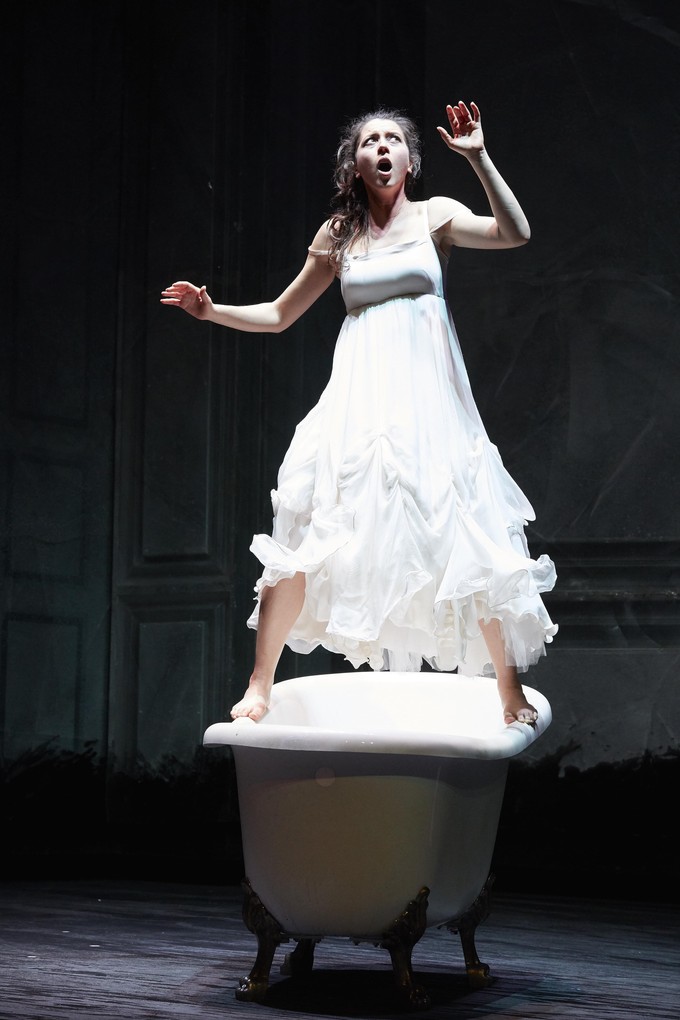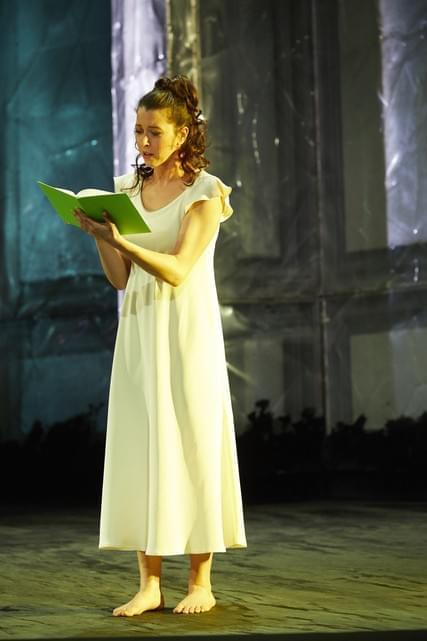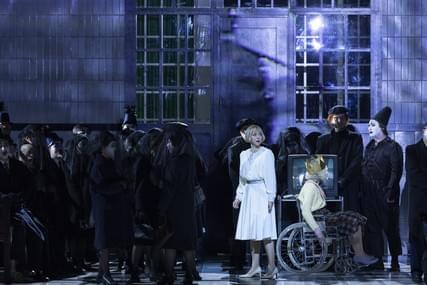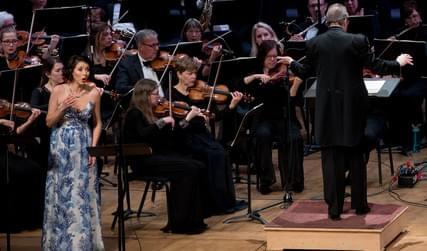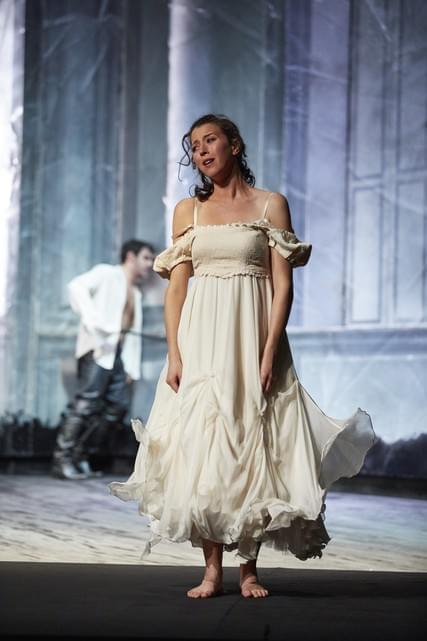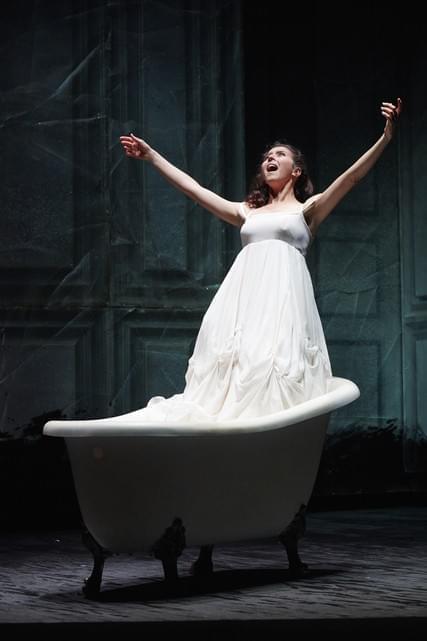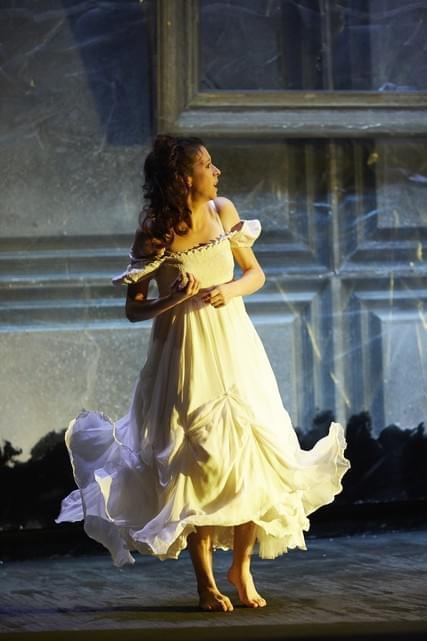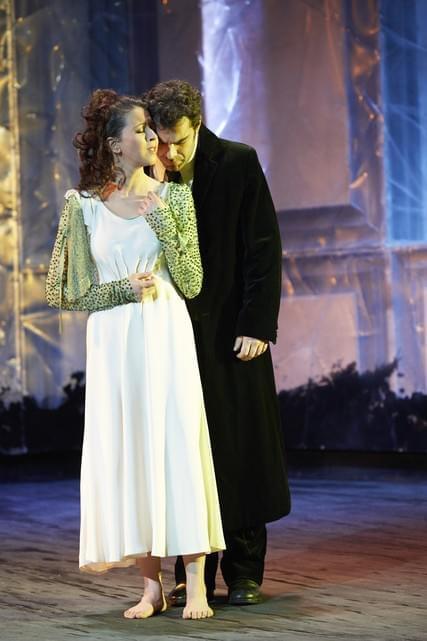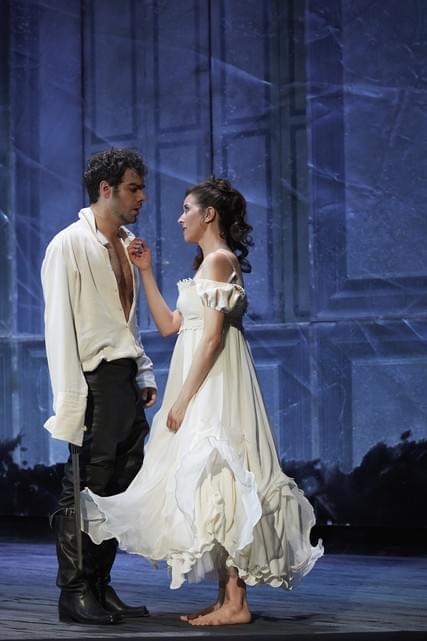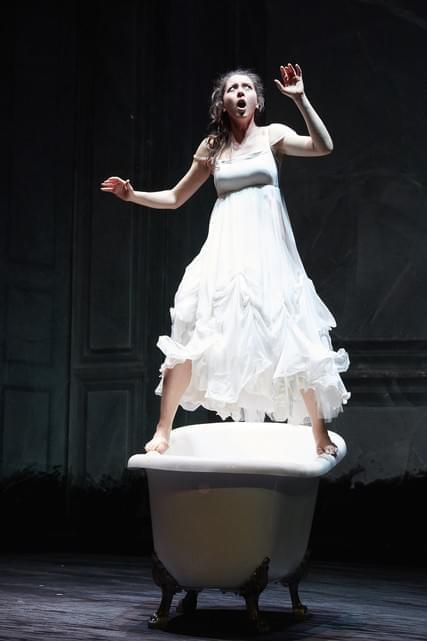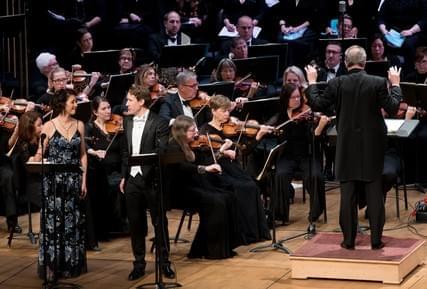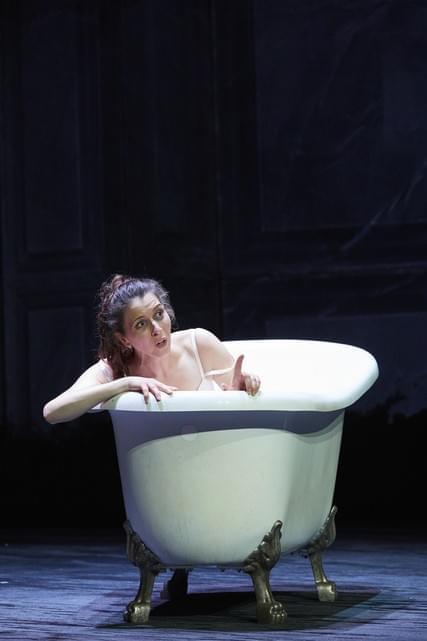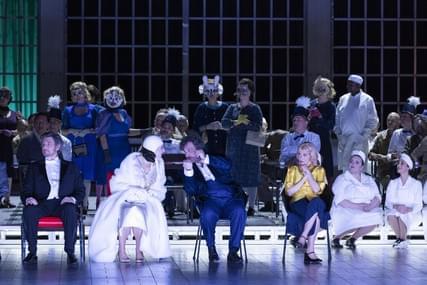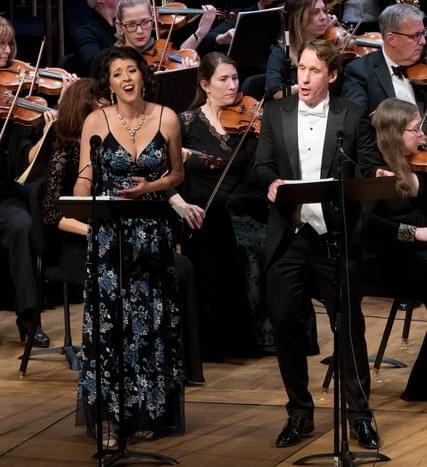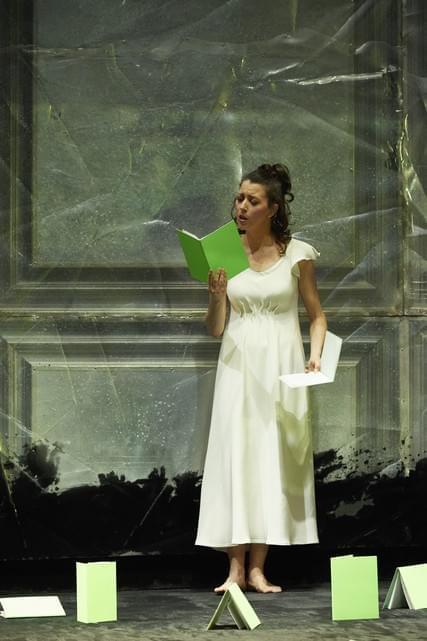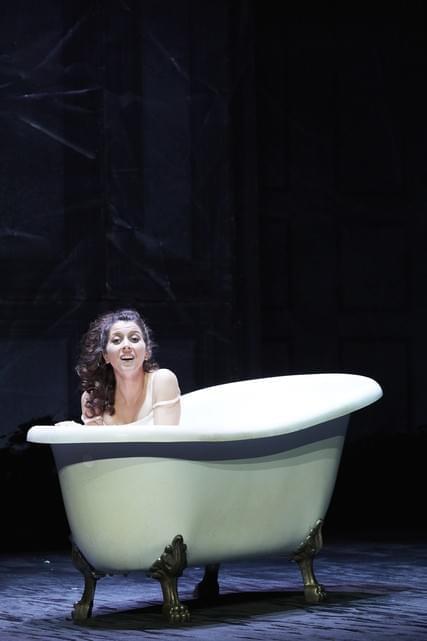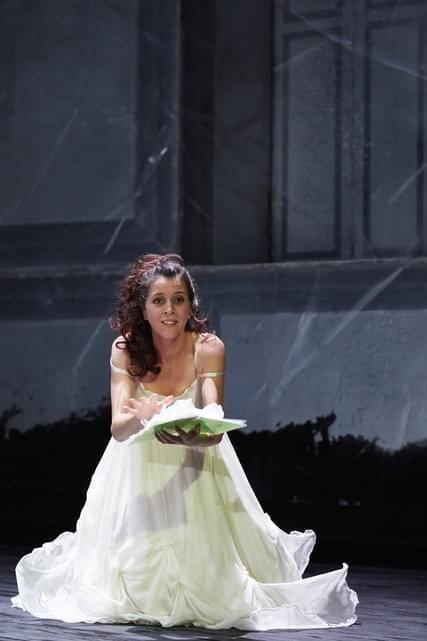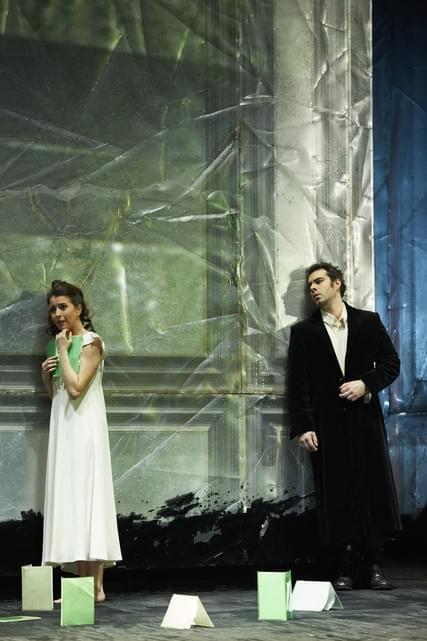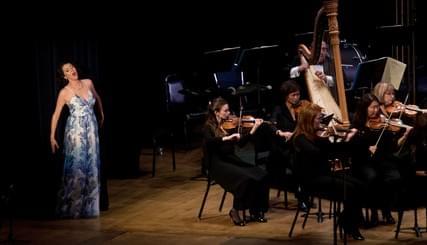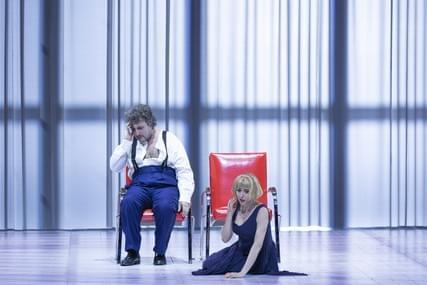Ophélie in Hamlet
Lisette Oropesa's portrayal of Ophélie has become a hallmark of her career, earning her widespread acclaim from critics across numerous performances. Central to the praise is her exceptional vocal prowess, characterized by a remarkable agility and virtuosity that allows her to navigate demanding coloraturas with apparent ease. Critics frequently highlight the combination of her technical skill with an expressive depth that imbues her performance with dramatic intensity. Her ability to deliver complex vocal lines effortlessly, coupled with her distinct timbre, described as velvety and matte-silvery, sets her apart from other sopranos.
Oropesa's interpretation of Ophélie also stands out for its emotional resonance. Her portrayal is not just technically flawless but also rich in dramatic nuance, capturing the character's tragic arc with a compelling blend of lightness and gravitas. This duality in her performance is noted as one of her greatest strengths, engaging audiences and critics alike. The vividness of her performance, often resulting in thunderous applause and standing ovations, is a testament to her ability to connect with the audience on both a technical and emotional level.
Furthermore, Oropesa's Ophélie is celebrated for its fresh and unique take on a classic role, bringing new insights and a sense of authenticity that resonate with modern audiences. Her performances are described as not only technically impressive but also deeply moving, combining her New Orleans training with a distinctive artistic vision that transforms traditional expectations of the role. This combination of technical mastery and emotional depth has solidified her status as a leading soprano in the operatic world, making her portrayal of Ophélie a definitive interpretation for many opera enthusiasts.
Lisette has been reviewed 52 times in this role.
Role Information
- Composer: Ambroise Thomas
- Opera: Hamlet
- Performances: 14
- Reviews: 52
- Venues: 4
- Organizations: 4
- Years: 2017 - 2024
But Lisette Oropesa possesses a pure soprano, with a bronzed middle, solar high notes, flawless virtuosity, and perfectly intelligible diction. Her madness scene, undressed, at the foot of a bathtub into which she lets herself sink, is striking. Just like her silent return at the end, a frail and poetic silhouette of a young girl on her knees scattering her…
But Lisette Oropesa possesses a pure soprano, with a bronzed middle, solar high notes, flawless virtuosity, and perfectly intelligible diction. Her madness scene, undressed, at the foot of a bathtub into which she lets herself sink, is striking. Just like her silent return at the end, a frail and poetic silhouette of a young girl on her knees scattering her own ashes from a funerary urn.
— Le Monde, March 2023
Ophelia, the daughter of Polonius; she embodies the role in a fully convincing vocal and dramatic intelligence, thanks to the dazzling American soprano Lisette Oropesa: with an endless line and mellifluous agility, everything conspires to portray a lover as radiant as she is desperate, yet powerless; ultimately suicidal. Her madness scene is deeply moving, impressive, and chilling, stylistically beyond reproach,…
Ophelia, the daughter of Polonius; she embodies the role in a fully convincing vocal and dramatic intelligence, thanks to the dazzling American soprano Lisette Oropesa: with an endless line and mellifluous agility, everything conspires to portray a lover as radiant as she is desperate, yet powerless; ultimately suicidal. Her madness scene is deeply moving, impressive, and chilling, stylistically beyond reproach, despite, at times, an articulation of our language that could still be improved.
— Classique News, March 2023
The transparency of the song, the iridescent vocalises, and its disarming simplicity triggered a well-deserved round of applause!
The transparency of the song, the iridescent vocalises, and its disarming simplicity triggered a well-deserved round of applause!
— Le Temps, February 2017
The luminous Ophelia of Lisette Oropesa, a brilliant soprano full of ardor and malleability, even in the discomfort of a perilous madness scene where the high notes and expression unfold without the slightest fragility until the character's death in her bathtub, a death that the choirs will accompany with a deeply moving final prayer.
The luminous Ophelia of Lisette Oropesa, a brilliant soprano full of ardor and malleability, even in the discomfort of a perilous madness scene where the high notes and expression unfold without the slightest fragility until the character's death in her bathtub, a death that the choirs will accompany with a deeply moving final prayer.
— SceneWeb, March 2023
Ophélie is played by Lisette Oropesa. She is the favorite of the audience as evidenced by the standing ovation she received, and it is well-deserved. Blessed with beautiful diction and crystal-clear high notes, she enchants our ears. Her presence is radiant and her "madness scene" is memorable, ending in a bathtub so dear to the director.
Ophélie is played by Lisette Oropesa. She is the favorite of the audience as evidenced by the standing ovation she received, and it is well-deserved. Blessed with beautiful diction and crystal-clear high notes, she enchants our ears. Her presence is radiant and her "madness scene" is memorable, ending in a bathtub so dear to the director.
— LE BRUITDUOFF TRIBUNE, March 2023
What Lisette Oropesa delivers in this role is spectacular. Her coloraturas ripple virtuosically. The timbre of her soprano, glowing like golden honey, bewitches in the lyrical passages. Nothing is missing. Her mad scene, delivered with the highest intensity, sends the audience into euphoria.
What Lisette Oropesa delivers in this role is spectacular. Her coloraturas ripple virtuosically. The timbre of her soprano, glowing like golden honey, bewitches in the lyrical passages. Nothing is missing. Her mad scene, delivered with the highest intensity, sends the audience into euphoria.
— Kurier, August 2024
Lisette Oropesa surprises with her vocal density and seduces with her virtuosity and dramatic intelligence.
Lisette Oropesa surprises with her vocal density and seduces with her virtuosity and dramatic intelligence.
— Les Echos, March 2023
Like Hamlet, the Ophelia in Ambroise Thomas's opera is one of the most demanding roles, from a vocal range perspective, in the dramatic repertoire. The American soprano Lisette Operesa, boasting an impressive musical career and already adorned with numerous awards, who will take on the role of Lucia de Lammermoor by Donizetti next July in Aix, is simply dazzling. Her…
Like Hamlet, the Ophelia in Ambroise Thomas's opera is one of the most demanding roles, from a vocal range perspective, in the dramatic repertoire. The American soprano Lisette Operesa, boasting an impressive musical career and already adorned with numerous awards, who will take on the role of Lucia de Lammermoor by Donizetti next July in Aix, is simply dazzling. Her playful and sensitive acting, full of grace and mischief, her sunny voice, which effortlessly reaches the high notes across an entire two octave range, with perfect French diction and a complete mastery of tempo and chromaticism, captivated the audience, earning her several lengthy ovations during the premiere. As lively as she is vibrant, this artist with a devastating smile possesses a devilish talent that has not finished making waves.
— Artistikrezo, March 2023
The delicate and virtuosic embodiment of an Ophelia on the edge of sanity by the excellent coloratura soprano Lisette Oropesa. Indeed, much like Donizetti or Bellini, Thomas offers his heroine one of the most demanding "madness" arias from the grand lyrical repertoire. With a notable climactic moment here, both dramatically and musically!
The delicate and virtuosic embodiment of an Ophelia on the edge of sanity by the excellent coloratura soprano Lisette Oropesa. Indeed, much like Donizetti or Bellini, Thomas offers his heroine one of the most demanding "madness" arias from the grand lyrical repertoire. With a notable climactic moment here, both dramatically and musically!
— Le Courrier, February 2017
If one artist were to be singled out, it would be Lisette Oropesa as Ophélie: After her arias, there was not just thunderous applause and bravos as with the other singers, but the Felsenreitschule was abuzz with genuinely uninhibited enthusiasm. Her lyrical coloraturas, the flexibility of her voice, the beauty of its sound despite the high musical-vocal demands – especially…
If one artist were to be singled out, it would be Lisette Oropesa as Ophélie: After her arias, there was not just thunderous applause and bravos as with the other singers, but the Felsenreitschule was abuzz with genuinely uninhibited enthusiasm. Her lyrical coloraturas, the flexibility of her voice, the beauty of its sound despite the high musical-vocal demands – especially in her mad scene aria in the fourth act – touched deeply and were incredibly captivating.
— Mittelbayerische, August 2024
Not surprisingly, Lisette Oropesa’s Ophélie has become one of her operatic calling cards in recent years, with numerous productions to her credit - including last year’s Paris Opera event, in which she starred opposite this evening’s Gertrude, Ève-Maud Hubeaux. The ideal combination of Oropesa’s limpid timbre, technical finesse, and a warmly-winning presence brought anticipated furore and a fully-deserved triumph for…
Not surprisingly, Lisette Oropesa’s Ophélie has become one of her operatic calling cards in recent years, with numerous productions to her credit - including last year’s Paris Opera event, in which she starred opposite this evening’s Gertrude, Ève-Maud Hubeaux. The ideal combination of Oropesa’s limpid timbre, technical finesse, and a warmly-winning presence brought anticipated furore and a fully-deserved triumph for the soprano. In keeping with her Hamlet, Oropesa’s interpretation is wonderfully-balanced, moving from her opening Act 1 duet Doute de la lumière through Ophélie’s Act 2 lament, Sa main depuis hier n'a pas touché ma main! to a wonderfully-shaped Act 2 garden scene, Adieu, dit-il, ayez-foi! - and further rising to the great drama of Act 3’s trio with Hamlet and Gertrude. The celebrated mad sccene is a natural show-stealer, and Oropesa brought to it quite consummate stage work to compliment an ideal filigran sweep in vocal range and dynamics - deservedly crowning her evening with a thundering ovation from the house.
— The Opera Critic, August 2024
The young soprano Lisette Oropesa endows the moment with an intimacy that is hard to match during the delicate coloratura aria À vos jeux, mes amis, sparking storms of enthusiasm from the audience at the premiere. Lisette Oropesa allows her youthful soprano to resonate in all its facets, especially during the mad scene aria, where she adds fuel to the…
The young soprano Lisette Oropesa endows the moment with an intimacy that is hard to match during the delicate coloratura aria À vos jeux, mes amis, sparking storms of enthusiasm from the audience at the premiere. Lisette Oropesa allows her youthful soprano to resonate in all its facets, especially during the mad scene aria, where she adds fuel to the fire with seemingly effortless legato and shimmering glissandi. Oropesa's coloratura passages are free and of a lyrical purity, her sotto voce is angelic.
— O-Ton, February 2017
What Lisette Oropesa achieves here, not only in terms of acting with her daring movements on the edges of a bathtub in which she ultimately drowns but especially vocally, can send shivers down one's spine. The bright, radiant timbre, the flawless, incredibly precise agility, and the downright sensational confidence in the high notes, along with the scenic presence of the…
What Lisette Oropesa achieves here, not only in terms of acting with her daring movements on the edges of a bathtub in which she ultimately drowns but especially vocally, can send shivers down one's spine. The bright, radiant timbre, the flawless, incredibly precise agility, and the downright sensational confidence in the high notes, along with the scenic presence of the fragile singer, make for the highlight of the evening.
— Peter Hagmann, February 2017
Against the ethereal archetypes, Lisette Oropesa makes the quivering sensuality of an Ophelia sparkle.
Against the ethereal archetypes, Lisette Oropesa makes the quivering sensuality of an Ophelia sparkle.
— La Terrasse, March 2023
And at his impeccable side, simply impeccable Lisette Oropesa once again in her performance as Ophélie, a role she covers with insulting ease, bell-ringing her voice through the vast Bastille hall, navigating the most intricate and demanding pages of her part with overwhelming agility. The combination of her mastery of her instrument and the freshness of her interpretation is truly…
And at his impeccable side, simply impeccable Lisette Oropesa once again in her performance as Ophélie, a role she covers with insulting ease, bell-ringing her voice through the vast Bastille hall, navigating the most intricate and demanding pages of her part with overwhelming agility. The combination of her mastery of her instrument and the freshness of her interpretation is truly exciting.
— Platea Magazine, March 2023
With all these unfortunate misunderstandings, the voice that Lisette Oropesa presents as Ophelia seems all the more pure in terms of articulation and timbre. Yet her singing line is rich with a nourished medium range, and her French pronunciation is diligent, as are her coloraturas. Her immense breath control allows her to link together several phrases of vocalizations (even if…
With all these unfortunate misunderstandings, the voice that Lisette Oropesa presents as Ophelia seems all the more pure in terms of articulation and timbre. Yet her singing line is rich with a nourished medium range, and her French pronunciation is diligent, as are her coloraturas. Her immense breath control allows her to link together several phrases of vocalizations (even if the high notes are not the most opulent). Her singing therefore appears all the more clear and crystalline at the fateful moment when Hamlet drives her towards a cloister (towards death, in fact). But even the resounding timbre, like glass, knows how to dive back into the bass, as if falling "to its knees" (the way by which Hamlet had sworn his love to her).
— Olyrix, March 2023
The demanding role of Ophelia, who, as Hamlet's bride, is innocently entangled in his plans for revenge and, as an "outcast," commits suicide in emotional chaos, suits Lisette Oropesa well. From her solitary madness scene with shifts from love to doubts and despair, "À vos jeux, mes amis" as the climax of the opera, one could not remain unaffected. There…
The demanding role of Ophelia, who, as Hamlet's bride, is innocently entangled in his plans for revenge and, as an "outcast," commits suicide in emotional chaos, suits Lisette Oropesa well. From her solitary madness scene with shifts from love to doubts and despair, "À vos jeux, mes amis" as the climax of the opera, one could not remain unaffected. There was indeed a desire for a scenic version that would have offered more space for the exceptional coloratura soprano. Nevertheless, the audience was ecstatic.
— Salzburger Nachrichten, August 2024
Lisette Oropesa is a great artist, very appreciated in Paris, and dramatically, her Ophelia is of an exemplary level.
Lisette Oropesa is a great artist, very appreciated in Paris, and dramatically, her Ophelia is of an exemplary level.
— Toute la culture, March 2023
Thanks to an exceptional Ophelia: Lisette Oropesa embodies a young woman touching in her fragility, who allows herself to die because she believes she has been abandoned by Hamlet. The singer does not hesitate to launch into breathtaking vocal runs while standing on the edges of a bathtub. A scene that the audience will not forget anytime soon. The soprano…
Thanks to an exceptional Ophelia: Lisette Oropesa embodies a young woman touching in her fragility, who allows herself to die because she believes she has been abandoned by Hamlet. The singer does not hesitate to launch into breathtaking vocal runs while standing on the edges of a bathtub. A scene that the audience will not forget anytime soon. The soprano then accomplishes the feat of singing while curled up at the bottom of the bathtub, before slowly lifting her head to deliver ethereal pianissimos. Chills guaranteed! The performance is all the more remarkable as it represents her debut in the role.
— Lausanne Local Paper, February 2017
He was well-matched by his Ophélie, Lisette Oropesa, who melded dramatic sensitivity with a clean, pearly soprano. The technically demanding mad scene, the conclusion to the opera’s broad-strokes depiction of Ophélie’s fragility, was delivered with a delicate effortlessness.
He was well-matched by his Ophélie, Lisette Oropesa, who melded dramatic sensitivity with a clean, pearly soprano. The technically demanding mad scene, the conclusion to the opera’s broad-strokes depiction of Ophélie’s fragility, was delivered with a delicate effortlessness.
— Washington Post, November 2019
The leading quartet is not to be outdone. With a soprano of bewildering agility, nurturing the most elegant phrasing, even within the frequently challenged high register, Lisette Oropesa, seasoned in the French romantic repertoire, delivers a memorable Ophélie that will be remembered for a long time [see our reviews of Mitridate, Les Indes galantes, Lucia di Lammermoor, Adina, Les Huguenots,…
The leading quartet is not to be outdone. With a soprano of bewildering agility, nurturing the most elegant phrasing, even within the frequently challenged high register, Lisette Oropesa, seasoned in the French romantic repertoire, delivers a memorable Ophélie that will be remembered for a long time [see our reviews of Mitridate, Les Indes galantes, Lucia di Lammermoor, Adina, Les Huguenots, and Robert le Diable].
— Anaclase, March 2023
Lisette Oropesa's Ophelia, as always when she sings the French repertoire, was also remarkably distinguished (even though her enemy might have dressed her): she adjusted to what the stage director requested (which was frankly insane) and sang wonderfully not only the mad scene, which was the most applauded during the course of the show (the grateful memory of the great…
Lisette Oropesa's Ophelia, as always when she sings the French repertoire, was also remarkably distinguished (even though her enemy might have dressed her): she adjusted to what the stage director requested (which was frankly insane) and sang wonderfully not only the mad scene, which was the most applauded during the course of the show (the grateful memory of the great Dessay was present for those of us fortunate enough to have seen her more than once in the role, but without any nostalgia since Oropesa's vocal condition is extraordinary).
— Pro Opera, March 2023
Lisette Oropesa, a sensitive acrobat, brings just the right amount of light to the role of Ophelia, even though the mad scene written by Thomas is quite laborious and quite pale.
Lisette Oropesa, a sensitive acrobat, brings just the right amount of light to the role of Ophelia, even though the mad scene written by Thomas is quite laborious and quite pale.
— Web Theatre, March 2023
At her side, Lisette Oropesa plays an Ophelia filled with delicacy, possessing a broader voice than those typically heard in this role, enabling her to easily fill the large space of La Bastille. The medium range is robust, the high notes solid and well-projected, the coloratura flawless, and the diction perfectly intelligible. Her mad scene, complete with reprises, earned her…
At her side, Lisette Oropesa plays an Ophelia filled with delicacy, possessing a broader voice than those typically heard in this role, enabling her to easily fill the large space of La Bastille. The medium range is robust, the high notes solid and well-projected, the coloratura flawless, and the diction perfectly intelligible. Her mad scene, complete with reprises, earned her a thoroughly deserved ovation.
— Forum Opera, March 2023
Extraordinary at her side was the performance of Ophélie by Lisette Oropesa, as every time she tackles the French repertoire: of notable importance (despite being dressed by a "foe") and as a good artist, she was committed to bravely performing all the follies conceived for her by the director. She sang beautifully not only the madness scene but also the…
Extraordinary at her side was the performance of Ophélie by Lisette Oropesa, as every time she tackles the French repertoire: of notable importance (despite being dressed by a "foe") and as a good artist, she was committed to bravely performing all the follies conceived for her by the director. She sang beautifully not only the madness scene but also the first aria, duets, and concerted numbers as well, and at the rising of the curtain, she was the one who received the longest and most thunderous applause.
— I Teatri dell Est, March 2023
Central to this success is the soprano Lisette Oropesa. She doesn't have the stratospheric highs that Natalie Dessay once had (who does?). She also does not have her theatrical madness. And yet, she offers with "her" Ophelia, a vocal and theatrical character, captivating with love, despair, innocence, and authenticity as it is rare to see and hear. The impermanence of…
Central to this success is the soprano Lisette Oropesa. She doesn't have the stratospheric highs that Natalie Dessay once had (who does?). She also does not have her theatrical madness. And yet, she offers with "her" Ophelia, a vocal and theatrical character, captivating with love, despair, innocence, and authenticity as it is rare to see and hear. The impermanence of live theater is a magical thing. It takes you into sudden emotion, moves you to tears, deliciously knots your stomach. What an extraordinary sensation. Thus, Lisette Oropesa (Ophelia), crumpling the pages of a school notebook to make improbable butterflies, nestling in a bathtub, taking solitary center stage, to sing her "At your games, gentlemen" funeral and desperate anthem to the love she feels for Hamlet remains an absolutely transcendent moment. Of course, the musical inspiration of Ambroise Thomas illustrating these stanzas is genius. Ophelia's words as she descends into love-madness are of an expressive force that takes your breath away. But to sing them, to say them like soprano Lisette Oropesa, suddenly supported while at the same time leading the Lausanne Chamber Orchestra, hitherto somewhat detached from the plot, is an artistic miracle that we would never want to leave and wish to see repeated incessantly. Alongside this miraculous Ophelia, resonating with her wonderful legato, her perfect diction, her astonishing and flawless preparation, the other protagonists are investing themselves in the wake of the American soprano.
— ResMusica, February 2017
The audience finally gave a memorable triumph to the artists embodying the two main roles: Lisette Oropesa, with a voice that is both agile and hearty (far from the very light sopranos that one usually hears in the role), impresses with her impeccable technical mastery but especially with the emotion that emanates from her singing, culminating in a mad scene…
The audience finally gave a memorable triumph to the artists embodying the two main roles: Lisette Oropesa, with a voice that is both agile and hearty (far from the very light sopranos that one usually hears in the role), impresses with her impeccable technical mastery but especially with the emotion that emanates from her singing, culminating in a mad scene that was rightly acclaimed.
— Premiere Loge Opera, March 2023
Lisette Oropesa has rightfully risen to the stardom of opera, and I don't believe there is a coloratura soprano more in-demand than her at this moment. Her singing touched perfection: good volume, secure high notes, crystalline voice, a beautiful vibrato that makes it flow, flawless coloraturas.
Lisette Oropesa has rightfully risen to the stardom of opera, and I don't believe there is a coloratura soprano more in-demand than her at this moment. Her singing touched perfection: good volume, secure high notes, crystalline voice, a beautiful vibrato that makes it flow, flawless coloraturas.
— Mundo Classico, March 2023
Exemplary in this demanding coloratura role was soprano Lisette Oropesa, whose voice seems to grow richer and more refined with each appearance. She has sung the role on stage before, and the sense of a specialist’s knowledge came through from her love duet in Act I and Act II scene onward. Oropesa’s coloratura exploits, especially in the show-stopping mad scene…
Exemplary in this demanding coloratura role was soprano Lisette Oropesa, whose voice seems to grow richer and more refined with each appearance. She has sung the role on stage before, and the sense of a specialist’s knowledge came through from her love duet in Act I and Act II scene onward.
Oropesa’s coloratura exploits, especially in the show-stopping mad scene that encompasses all of Act IV, revealed consummate control and grace. Incendiary high notes floated, chromatic runs slid downward with clarity, and trills glimmered. Particularly convincing were the runs that rocketed upward, ending abruptly as high as the E off the staff, incarnating the character’s mad outbursts.
— Washington Classical Review, November 2019
Lisette Oropesa's Ophelia sets itself apart from the lighter renditions of Ophelia we've experienced in recordings and on stages. Oropesa is a lyric coloratura, with controlled agility, a broad middle register, and very well-projected and even high notes, free of any flaws. She certainly possesses the technique taught in American vocal schools, complete with the associated phrasing and diction, but…
Lisette Oropesa's Ophelia sets itself apart from the lighter renditions of Ophelia we've experienced in recordings and on stages. Oropesa is a lyric coloratura, with controlled agility, a broad middle register, and very well-projected and even high notes, free of any flaws. She certainly possesses the technique taught in American vocal schools, complete with the associated phrasing and diction, but also, and importantly, she has an intelligent approach to expression and (something other singers lack) an intuitive understanding of the characters she embodies. She is immediately convincing because she brings an incredible humanity to her performances. Her career will undoubtedly continue to surprise us, yet she always fully embodies the intended character, whether she's portraying a schoolgirl in a blazer and socks or revealing heartrending intimacy in her disarray during moments of madness. Her final scene, oscillating between despair and hallucination, obviously draws from other mad scenes in the repertoire, yet she manages to make it uniquely her own, creating a world that is both utterly surreal and unhinged while being incredibly realistic with her dance steps, and above all, her total freedom in her body movement: it's masterful.
— Wanderer, April 2023
Lisette Oropesa (Ophelia) brings her stage radiance, sensitivity, and her supple, fruity voice to a fiancée-schoolgirl who proves wonderfully expressive in madness and suicide, scenes that were greeted with a lengthy ovation. An admirable artist with impeccable French diction (which Crescendo has long emphasized the qualities of).
Lisette Oropesa (Ophelia) brings her stage radiance, sensitivity, and her supple, fruity voice to a fiancée-schoolgirl who proves wonderfully expressive in madness and suicide, scenes that were greeted with a lengthy ovation. An admirable artist with impeccable French diction (which Crescendo has long emphasized the qualities of).
— Crescendo Magazine, March 2023
Lisette Oropesa also achieved a musical and theatrical triumph as Ophelia, finding the part’s hurt and pathos as well as the terrific staccati and chromatic scales; she has become an excellent interpreter of French opera.
Lisette Oropesa also achieved a musical and theatrical triumph as Ophelia, finding the part’s hurt and pathos as well as the terrific staccati and chromatic scales; she has become an excellent interpreter of French opera.
— Gay City News, December 2019
Ophelia’s complex mad scene is a welcome island of repose amidst the agonies of marital betrayal, fratricide, and Oedipal vengeance. Warlikowski’s Ophelia presents herself as a ghostly, flighty nocturnal creature, simply dressed with a very plain wig of blond hair describing the wasted life that she foretells in her splendid second act aria “Adieu, dit-il, ayez-foi!”. Thomas’ Ophélie was beautifully sung,…
Ophelia’s complex mad scene is a welcome island of repose amidst the agonies of marital betrayal, fratricide, and Oedipal vengeance. Warlikowski’s Ophelia presents herself as a ghostly, flighty nocturnal creature, simply dressed with a very plain wig of blond hair describing the wasted life that she foretells in her splendid second act aria “Adieu, dit-il, ayez-foi!”. Thomas’ Ophélie was beautifully sung, and acted with uncanny poise by American soprano Lisette Oropesa. Mme. Oropesa’s upper voice shone magnificently throughout the evening, and of course particularly in the intricacies of the mad scene. For this famed episode her plain blond wig was changed into a splendid, platinum Cleopatra like wig, and among its myriad sections she danced a waltz with a sharply elegant, black clad danseur.
— Opera Today, March 2023
Lisette Oropesa, beloved by the Parisian audience, achieves another great success. Her voice is not daunted by the large spaces of the Parisian theater and expands with great ease, especially in the middle and upper registers. Effortlessness in emission, precise vocalization, clear trills are some of the most evident characteristics.
Lisette Oropesa, beloved by the Parisian audience, achieves another great success. Her voice is not daunted by the large spaces of the Parisian theater and expands with great ease, especially in the middle and upper registers. Effortlessness in emission, precise vocalization, clear trills are some of the most evident characteristics.
— Opera Click, March 2023
Queen of the Evening: Lisette Oropesa And one outshines them all: the American soprano Lisette Oropesa, as Ophelia, floods the orchestra and ensembles with her sparkling, enchantingly beautiful soprano, which she carries with breathtaking perfection to the highest heights. During the deafening cheers following her mad scene aria, one briefly fears for the building's structural integrity and the continuation of…
Queen of the Evening: Lisette Oropesa And one outshines them all: the American soprano Lisette Oropesa, as Ophelia, floods the orchestra and ensembles with her sparkling, enchantingly beautiful soprano, which she carries with breathtaking perfection to the highest heights. During the deafening cheers following her mad scene aria, one briefly fears for the building's structural integrity and the continuation of the opera.
— BR Klassik, August 2024
The lirico-leggera soprano Lisette Oropesa portrayed Ophelie. Her velvety dark timbre suited a score which is mostly written in the middle of the voice, and her depurated technique enabled her to sing the octave interval from central to high B flat with sweetness and delicacy in the Act two aria “Adieu dit-il,ayez foi.” But, at the same time, her several…
The lirico-leggera soprano Lisette Oropesa portrayed Ophelie. Her velvety dark timbre suited a score which is mostly written in the middle of the voice, and her depurated technique enabled her to sing the octave interval from central to high B flat with sweetness and delicacy in the Act two aria “Adieu dit-il,ayez foi.” But, at the same time, her several ascensions to high notes were secure, brilliant, and projected. These included several B naturals in the cabaletta of the second act aria, a high C in the first act duet, and a C sharp in the already mentioned cabaletta. But it was the “mad scene” the audience was waiting for, and Oropesa didn’t disappoint at all. She sang clean scales delivering sparkling B naturals and C sharps, maintained her strong center secure for the ballad section, and fast depurated coloratura for the Waltz sections. The qualities of her voice matched the strange and demanding vocal writing of this long scene which required singing fast and high, slow and central, crazy coloratura, and a secure high register for the last section when the tessitura becomes really high. I can’t say much about her acting as I didn’t understand what was going on in this scene, but she did what she was asked with determination, finishing the scene with a soaring pianissimo high B natural as she disappeared inside a bathtub.
— OperaWire, March 2023
Lisette Oropesa manages to bring out all the tragedy endured by an Ophelia on the brink of breakdown and, with ultimate courage, to literally die of love. The American soprano, with a rare dramatic intensity, moved the audience that rewarded her with a long standing ovation.
Lisette Oropesa manages to bring out all the tragedy endured by an Ophelia on the brink of breakdown and, with ultimate courage, to literally die of love. The American soprano, with a rare dramatic intensity, moved the audience that rewarded her with a long standing ovation.
— France Info:Culture, March 2023
At the Bastille, Lisette Oropesa, whose fruity timbre blossoms more radiant than ever, embodies a youthful and trembling Ophélie, promised a happiness cruelly torn from her.
At the Bastille, Lisette Oropesa, whose fruity timbre blossoms more radiant than ever, embodies a youthful and trembling Ophélie, promised a happiness cruelly torn from her.
— La Croix, March 2023
Unlike sopranos of the often maligned type of "ornament singers," the American soprano Lisette Oropesa has a velvety soprano with a dark, matte-silvery timbre. In Ophelia's lament over Hamlet's cooled love – "Adieu dit-il, ayez foi" – she enveloped a pallid, as if veiled by a dull sheen, sound of pain and sorrow. Confronting Hamlet, she convinced through dramatic acting…
Unlike sopranos of the often maligned type of "ornament singers," the American soprano Lisette Oropesa has a velvety soprano with a dark, matte-silvery timbre. In Ophelia's lament over Hamlet's cooled love – "Adieu dit-il, ayez foi" – she enveloped a pallid, as if veiled by a dull sheen, sound of pain and sorrow. Confronting Hamlet, she convinced through dramatic acting with the means of verbal espressivo. The ten-minute scene where the mad (or driven) Ophelia sings of a water nymph who lures men to their death ranks among the most famous examples of the madness aria in the 19th century. The expressive tension hidden in this seemingly decorative music was revealed by Maria Callas. Lisette Oropresa, without any mannerist adaptation, showed herself inspired by her. She led her voice as confidently through regions where the voice reaches up to the B and C sharp, as through the without birdlike chirping sweetened coloratura cascades of the waltz section.
— Frankfurter Allgemeine Zeitung, August 2024
Just as, and especially, Lisette Oropesa. When she assumes the role of Ophélie, the character is not merely a fragile, glass-like femme fragile: Instead, the coloratura soprano infuses her sometimes simple, sometimes richly ornamented cantilenas with the fullness and warmth of a lover who is incomprehensibly betrayed and subsequently succumbs to death. In her timbre, there's a hint of Cotrubas,…
Just as, and especially, Lisette Oropesa. When she assumes the role of Ophélie, the character is not merely a fragile, glass-like femme fragile: Instead, the coloratura soprano infuses her sometimes simple, sometimes richly ornamented cantilenas with the fullness and warmth of a lover who is incomprehensibly betrayed and subsequently succumbs to death. In her timbre, there's a hint of Cotrubas, a dash of Gheorghiu - and yet Oropesa is a diva of her own class, capable of modulating her luminous high notes into delicate piano: This provoked storms of applause already after her mad scene.
— Die Presse, August 2024
Soprano Lisette Oropesa, with her radiantly pure vocal quality, embodied a commendable Ophelia. Dressed in a white nightgown, the American singer managed to terrify us in a mesmerizing madness scene with immense vocal agility sung to the very edge of breath.
Soprano Lisette Oropesa, with her radiantly pure vocal quality, embodied a commendable Ophelia. Dressed in a white nightgown, the American singer managed to terrify us in a mesmerizing madness scene with immense vocal agility sung to the very edge of breath.
— Scherzo Magazine, March 2023
In a concert performance of this opera last year, American soprano Lisette Oropesa triumphed at the Salzburg Festival. Is it any wonder then that the leadership of this year's summer showcase called for the star singer to play another "leading role"? Certainly not. Oropesa perfectly combines vocal lightness and elasticity in her singing expression, along with an incredible technique and…
In a concert performance of this opera last year, American soprano Lisette Oropesa triumphed at the Salzburg Festival. Is it any wonder then that the leadership of this year's summer showcase called for the star singer to play another "leading role"? Certainly not. Oropesa perfectly combines vocal lightness and elasticity in her singing expression, along with an incredible technique and a tendency to convince audiences that she can work with any vocal range or dynamics that come her way. The likable singer evidently did everything she could to portray Ophelia as a disciplined member of an overall very balanced ensemble. But inevitably, she is the one who always literally lights up the stage. And her scene featuring "Et maintenant écoutez ma chanson... Le voilà! Je crois l'entendre," which she enjoyed not only in her concert robe but disheveled, tousled, and barefoot, was a genuine "showstopper" followed by several minutes of enthusiastic applause from the audience. No wonder: listeners are not often treated to such a brilliant cascade of coloratura, for which the sense of effect and the drama and overall graduation of the musical number are not just about spectacle but also about love for bel canto.
— Klasika Plus, August 2024
Lisette Oropesa, who has long garnered a large fan base here, is allowed to shape another legendary madness scene from the opera literature following her acclaimed performance in "Lucia di Lammermoor." As Ophelia, she does not hold back from delivering cascades of shimmering coloratura and brilliantly radiant high notes that plunge the audience into a frenetic frenzy, earning her endless…
Lisette Oropesa, who has long garnered a large fan base here, is allowed to shape another legendary madness scene from the opera literature following her acclaimed performance in "Lucia di Lammermoor." As Ophelia, she does not hold back from delivering cascades of shimmering coloratura and brilliantly radiant high notes that plunge the audience into a frenetic frenzy, earning her endless ovations during the performance. There is no trick in the diva’s playbook that Oropesa doesn't master. Yet, to diminish her portrayal to mere sensational vocal acrobatics would be an understatement. She never loses sight of Ophelia's emotional depth, convincingly conveying the character’s youthful infatuation as well as the despair in the death scene, which she wraps in delicately whispered piano phrases.
— OVB Heimatzeitungen, August 2024
Lisette Oropesa's portrayal of Ophelia is just as accomplished. Beautiful, delicate, and lively, she embodies this young girl in love to the point of death. Vocally, it is rare to have such a complete soprano in a "coloratura" role. For the high notes, the vocal runs, the trills were all perfectly performed. But it's especially the beauty of the voice…
Lisette Oropesa's portrayal of Ophelia is just as accomplished. Beautiful, delicate, and lively, she embodies this young girl in love to the point of death. Vocally, it is rare to have such a complete soprano in a "coloratura" role. For the high notes, the vocal runs, the trills were all perfectly performed. But it's especially the beauty of the voice over the whole vocal range that captivates. The richness of the harmonics in the midrange and the lower register could at times evoke that of Angela Georghiu, so rich. What an artist! Compared to the perfectly matched and accomplished pair, the rest of the cast hold up perfectly.
— Classique News, February 2017
It's incredible what vocal acrobatics Lisette Oropesa demonstrated in the best vocal sense during her major aria in the second part! The audience went wild.
It's incredible what vocal acrobatics Lisette Oropesa demonstrated in the best vocal sense during her major aria in the second part! The audience went wild.
— Opern Magazin, August 2024
It must be noted that this achievement benefits from a musical performance that honors the Paris Opera, bringing together four exceptional personalities for the four main roles: Lisette Oropesa dazzles with her human fragility (which is in no way vocal!), with touching commitment, the distress of one who has not been touched by the wing of madness and does not…
It must be noted that this achievement benefits from a musical performance that honors the Paris Opera, bringing together four exceptional personalities for the four main roles: Lisette Oropesa dazzles with her human fragility (which is in no way vocal!), with touching commitment, the distress of one who has not been touched by the wing of madness and does not understand how her love eludes her, who believes she still loves a man, Hamlet, when she clings only to a shadow. To join him, she will venture into the corridors of madness without truly arriving there, Hamlet stubbornly remains withdrawn in this elsewhere where she no longer has a place. Lisette Oropesa's French pronunciation is exemplary, her voice with a peach-like timbre seduces from her first intervention, stirs emotion in her desperate duet, arouses sympathy in this ultimate effort to reach "the other shore", where she drowns.
— Opera Online, March 2023
"Bouquets and wreaths rained down from every box." If the audience of the Salzburg Festival had taken the flower decorations from their dinner, Lisette Oropesa would probably have been buried under flowers instead of sinking into the water as Ophelia, as Shakespeare's "Hamlet" implies. In the middle of the insanity scene from the fourth act, the Felsenreitschule audience began to…
"Bouquets and wreaths rained down from every box." If the audience of the Salzburg Festival had taken the flower decorations from their dinner, Lisette Oropesa would probably have been buried under flowers instead of sinking into the water as Ophelia, as Shakespeare's "Hamlet" implies. In the middle of the insanity scene from the fourth act, the Felsenreitschule audience began to stomp their feet, forcing Oropesa to bow and conductor Bertrand de Billy to demand the continuation of the performance. Because the scene is indeed insane, in the vocal demands that Ambroise Thomas has composed into it, after madness in opera often expresses itself in crazy coloraturas. But also because Oropesa embodies madness. The American is currently the leading singer in the rare field of lyrical coloratura soprano. Which means nothing other than she can do everything: trills, scales, repeated top notes with sensational precision - and all while sounding lyrical, heartwarming, and moving. It's fascinating how softly her high notes flood in, even more fascinating how she infuses the "Nordic" tinged ballad intended for the premiere singer with the shimmering darkness of a deep lake.
— Süddeutsche Zeitung, August 2024
She fills the space effortlessly, with perfect technique and a diction so clear that everyone can understand without needing to look at the subtitles.
She fills the space effortlessly, with perfect technique and a diction so clear that everyone can understand without needing to look at the subtitles.
— Le Figaro, March 2023
Virtuosity, lightness, agility, of course, but also dramatic colors, stamina, and a great ease for vocalizations, Lisette Oropesa possesses all of this and much more. Born and trained in New Orleans, Louisiana, she will be returning to Paris for "The Puritans" next January. Her pleasure in being on stage, very contagious and stimulating for her partners, adds even more to…
Virtuosity, lightness, agility, of course, but also dramatic colors, stamina, and a great ease for vocalizations, Lisette Oropesa possesses all of this and much more. Born and trained in New Orleans, Louisiana, she will be returning to Paris for "The Puritans" next January. Her pleasure in being on stage, very contagious and stimulating for her partners, adds even more to her popularity with the audience, and undoubtedly, it is she who, at the end of the show, will gather the most spectacular favor of the applause meter.
— Forum Opera, August 2024
The flexible voice with beautiful, rich mid-range.
The flexible voice with beautiful, rich mid-range.
— Concert Classic, March 2023
The entire performance was magnificent and consistently maintained the highest level. Musicians and singers in the chorus and as soloists delivered outstanding performances. If one artist should be singled out, it would be Lisette Oropesa as Ophélie: after her arias, there was not just thunderous applause and bravos, as with the other singers; the audience erupted in a genuinely exuberant…
The entire performance was magnificent and consistently maintained the highest level. Musicians and singers in the chorus and as soloists delivered outstanding performances. If one artist should be singled out, it would be Lisette Oropesa as Ophélie: after her arias, there was not just thunderous applause and bravos, as with the other singers; the audience erupted in a genuinely exuberant enthusiasm for her. Her lyrical coloratura, the flexibility of her voice, the beauty of her tone despite the high musical and vocal demands - especially in her mad scene aria in the fourth act - deeply moved and were incredibly captivating. As the audience did not want to stop their applause after a few minutes, the conductor signaled the chorus for a new entrance and continued the performance with the fifth act. Applause that seemed endless also at the end.
— Berchtesgadener Anzeiger, August 2024
Lisette Oropesa (Ophélie) delivers her mad scene in its entirety, with a wide coloratura range where breath control and line are executed over a space as vast as Bastille.
Lisette Oropesa (Ophélie) delivers her mad scene in its entirety, with a wide coloratura range where breath control and line are executed over a space as vast as Bastille.
— Alta Musica, March 2023
Famous Interpreters
The role of Ophélie in Ambroise Thomas's opera "Hamlet" was first performed by the Swedish soprano Christine Nilsson at the opera's premiere on March 9, 1868, at the Opéra in Paris, France. Christine Nilsson was born on August 20, 1843, in Västra Karup, Sweden, and she achieved international fame as an operatic soprano. Beyond her role as Ophélie, Nilsson was well-documented for her performances in roles such as Marguerite in Charles Gounod's "Faust" and Violetta in Giuseppe Verdi's "La Traviata." Her career was marked by her appearances in major opera houses across Europe and the United States during the late 19th century.
Among other interpreters of Ophélie, the soprano Nellie Melba, active primarily in the late 19th and early 20th centuries, is notable. Melba's career was distinguished by her performances at the Royal Opera House, Covent Garden, and the Metropolitan Opera in New York. While specific recordings of her as Ophélie are not well-documented, her general reputation as a leading soprano of her time is well-established. Another significant interpreter was the French soprano Mado Robin, active in the mid-20th century. Robin was known for her performances at the Opéra-Comique in Paris, and her recording of the "Mad Scene" from "Hamlet" is a documented part of her discography. Limited historical documentation is available regarding other specific performances or recordings of Ophélie by these artists.
About the Composer
Ambroise Thomas, a notable 19th-century French composer, was celebrated for his operatic contributions that often blended lyrical elegance with dramatic flair. Born in 1811, Thomas became a prominent figure in the French operatic tradition, particularly known for infusing his works with melodic richness and intricate orchestrations. His opera "Hamlet," premiered in 1868, stands out as a significant adaptation of Shakespeare's iconic play, reflecting the Romantic era's fascination with psychological depth and complex characters. Thomas wrote "Hamlet" during a period when French audiences were captivated by grand operas that explored profound themes, and he ingeniously tailored the narrative to fit the operatic stage, including a new, more triumphant ending. This opera is significant not only for its ambitious scope but also for Thomas's masterful vocal writing. He crafted arias and ensembles that demand both technical precision and emotional expressiveness, allowing singers to explore the multifaceted emotions of Shakespeare's characters. Thomas's "Hamlet" remains a testament to his ability to marry dramatic content with musical beauty, offering a fresh lens through which to experience the timeless tragedy.
Performance Photos
- March 8, 2023Elisa Haberer
- March 8, 2023Elisa Haberer
- March 8, 2023Elisa Haberer
- March 8, 2023Elisa Haberer
- March 8, 2023Elisa Haberer
Performance History
Lisette has performed Ophélie 14 times.

